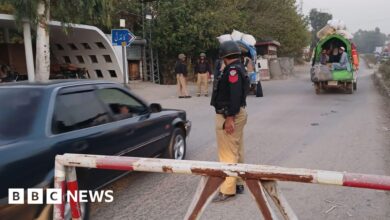Hamas faces growing public discontent as Gaza war erodes support
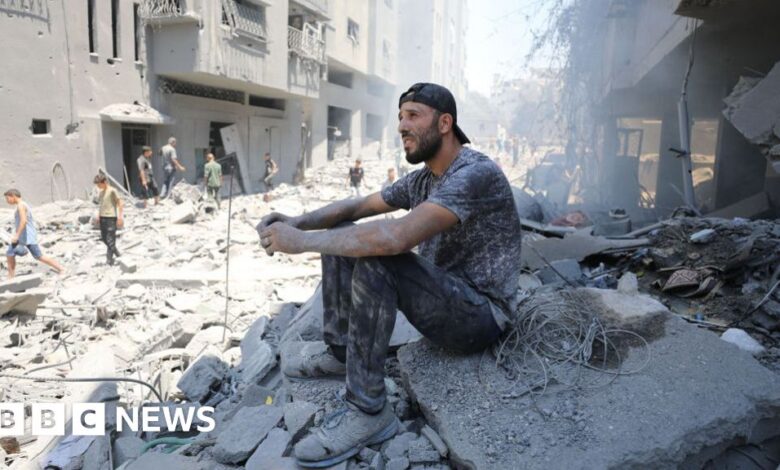
Via Lucy Williamson and Rushdi Aboualouf, BBC Middle East correspondent & Gaza correspondent
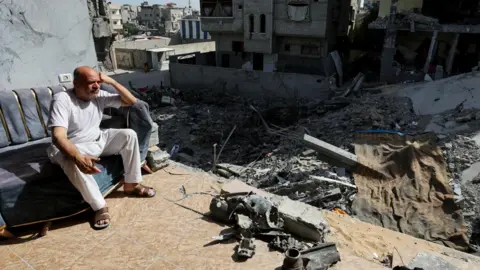 Reuters
ReutersThe man in the video is in great pain, the pain evident on his bloody face.
“I was an academic doctor,” he said, “I had a good life, but we had a dirty life. [Hamas] leaders. They are used to our bloodshed, God curse them! They are scum!”
The video – unthinkable before the Gaza war – was filmed outside a hospital where hundreds of Palestinians were killed and wounded following Israel’s hostage rescue operation from central Gaza last month.
Warning: Graphic images
Seconds before the video ended, he turned to the crowd.
“I am one of you,” he said, “but you are cowards. We could have avoided this attack!”
This video has gone viral. And it’s not the only one.
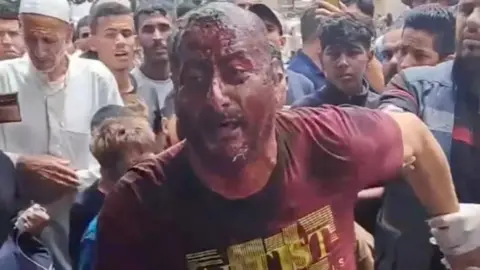 UGC
UGCPublic criticism of Hamas is growing in Gaza, both on the streets and online.
Some have publicly criticized Hamas for hiding hostages in apartments near a crowded market, or for firing rockets from civilian areas.
Residents told the BBC that swearing and cursing at Hamas leaders is now common in the markets, and some donkey drivers have even nicknamed their animals after Hamas’s leader in Gaza – Yahya Sinwar – urging the donkeys forward by shouting “Yallah, Sinwar!”
“People say things like ‘Hamas destroyed us’ or even ask God to take their lives,” one man said.
“They asked what the purpose of the October 7 attacks was – some said it was a gift to Israel.”
Some even urged their leaders to agree to a ceasefire with Israel.
There are still people in Gaza who are fiercely loyal to Hamas, and after years of repressive control, it is difficult to know how much support the group has lost or how much protesters now feel able to speak their minds.
But a senior Hamas official privately admitted to the BBC a few months ago that they were losing support because of the war.
And even some of the group are wavering.
A senior Hamas government official told the BBC that the Hamas attacks were “a crazy, uncalculated leap”.
He asked us to conceal his identity.
“I know from my work with the Hamas government that they are well prepared for a military attack, but have neglected the domestic front,” he said.
“They are not building any safe shelters for people, they are not stockpiling enough food, fuel and medical supplies. If my family and I survive this war, I will leave Gaza the first chance I get.”
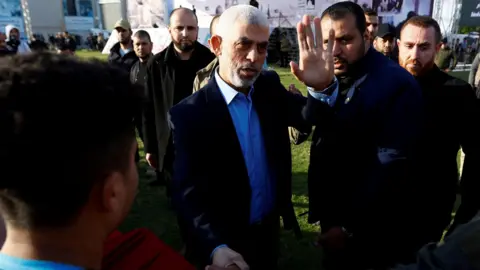 Reuters
ReutersThere had been opposition to Hamas long before the war, although much of this opposition remained secret for fear of reprisals.
The last time Palestinian elections were held in 2006, in party-list voting, Gazans voted for Hamas in 15 of the territory’s 24 seats – in the remaining nine districts, voters voted for another party.
A year later, Hamas forcibly drove Palestinian Authority forces out of Gaza, causing a deep rift with the rival Fatah movement, and took control of the entire Gaza Strip.
Ameen Abed, a political activist, said he had been arrested several times for speaking out against Hamas before the war, but said – nine months on – dissent had become more common there.
“In Gaza, most people are critical of what Hamas has done,” he said.
“They see children living in tents, and insulting their leaders has become a habit. But it is supported by many people outside the Gaza border, who are sitting under air conditioning in their comfortable homes, who have not lost a child, a home, a future, a leg.”
Despair and war are eroding social structures in Gaza, and Hamas’ control is no longer what it once was.
Four-fifths of Gaza’s population is displaced, often moving between temporary shelters.
And law and order have broken down in many places, in part because of Israel’s policy of targeting Gaza’s security forces — not just Hamas’ official internal security forces, but also community police responsible for street crime.
As control weakened, criminal gangs flourished, looting neighborhoods and aid convoys; and private security companies—some run by powerful local families—emerged.
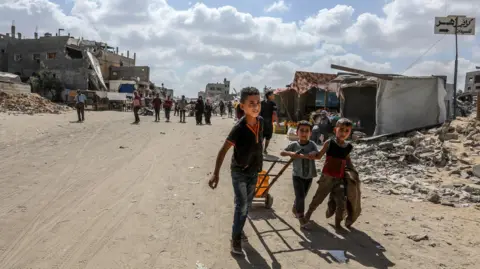 Anadolu via Getty Images
Anadolu via Getty ImagesAn aid worker operating in Gaza described “total chaos on the streets” and “anarchy”, saying civil order had completely broken down due to Israeli policy.
The Israeli prime minister has repeatedly vowed to continue the war until Hamas’ military and government capabilities are destroyed.
But some aid agencies – in both northern and southern Gaza – also report that local Hamas officials regularly inspect their operations, and videos are regularly circulated showing unofficial Hamas security forces shooting and beating people caught looting.
Dozens of people have been killed by Hamas in bloody clashes with other local groups, after Israeli troops withdrew from an area, a reliable source has told the BBC.
Fears of criticizing Gaza’s leaders may have eased, but they have not disappeared, so it remains difficult to gauge precisely, beyond individual testimony, how much support for the group is changing.
Some, like Jihad Talab, 26, remain strong supporters of Hamas.
Displaced from the Zeitoun area of Gaza City with his wife, daughter and mother, and now taking refuge in Deir al Balah, he said the group was not responsible for their suffering.
“We must support [Hamas] because it is the people working on the ground who understand the battle – not you or me,” he said. “Empty accusations only serve the Occupation. [Israel]. We will support it until our last breath.”
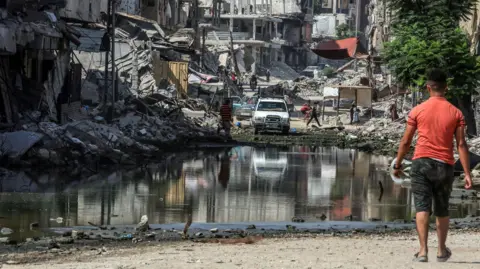 Anadolou via Getty Images
Anadolou via Getty ImagesA regular poll by the Palestinian Center for Policy Research and Surveys, a West Bank-based think tank, says most people in Gaza still blame Israel and its allies for the war, rather than Hamas.
The latest survey in June said nearly two-thirds of respondents in Gaza were satisfied with Hamas – up 12 points from December – and suggested that only about half would still want Hamas to run Gaza after the war ends, more than any other option.
Glimpses through the cracks in the media blockade around Gaza can never give a full assessment of the situation. International journalists are barred by Israel and Egypt from reporting directly on the situation there.
It is clear that Hamas remains very sensitive to public opinion.
Similar messages regularly appear on several social media platforms to justify their actions, often in response to domestic criticism.
A source close to Hamas told the BBC there is an organised international network to coordinate social media messages for the group.
After Israeli families released video footage of the moment female soldiers were kidnapped by Hamas units on October 7, some in Gaza questioned whether targeting women in war is consistent with Islamic teachings.
In response, several pro-Hamas social media accounts have posted similar messages, asserting that soldiers – male or female – are legitimate military targets and saying the unit was involved in the shooting of protesters in Gaza during protests six years ago.
Criticism of Hamas is growing more fierce, and long-standing divisions over Hamas’ rule in Gaza are becoming apparent.
From the devastation of the war between Israel and Hamas, a new war is emerging: the battle for control of public opinion right in Gaza.





